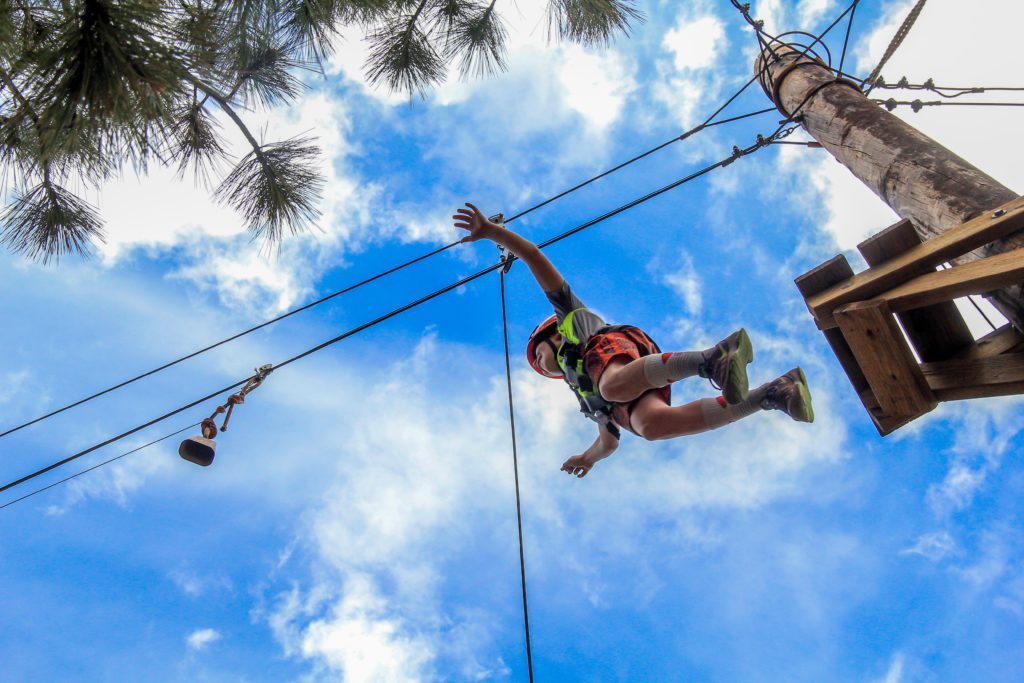By: Dan Baer and Rachel Shyloski, MSW
Registration has begun for Jewish overnight camp. For most of us, we think of sending our children for a multitude of reasons; being with friends, experiencing daily life through a Jewish lens, playing sports, connecting without the use of screens and so much more. But one aspect of camp, which we see every summer, exemplifies the real power of camp. This is the story of Alex.
Harness on. Helmet on. Shoes tied. Alex’s cabin is at the high ropes course and her cabin is doing “Leap of Faith”, an element soaring over 30 feet above the ground. Alex has now watched a couple of friends do it, seeing the exhilaration on their faces when they leap off the platform, reaching out to hit the bell before they are slowly lowered to the ground. It’s her turn. After going through final checks with the Ropes Specialist, Alex hears, “Climb on” before taking the first step up the pole toward the platform.
Alex has been here before but hasn’t made it more than three rungs off the ground. This time feels a little different. She is having her best summer at Camp. She loves her counselors and has made some new friends. With encouragement from her new friends, Alex begins her climb. You can see her nervous energy as she approaches the fourth rung, but she’s determined to up get there. With her friends’ support getting louder and louder, a couple of other campers from a nearby group have joined to encourage her.
Alex’s time at the ropes course exemplifies the goal of the Camp experience; to send campers home a better version of themselves. This falls in line with the work done by Abraham Maslow, whose Theory of Human Motivation best explains why camp works. He believed people have an inborn desire to be “self-actualized,” or to be all they can be. Often displayed in a pyramid, he also posited that in order to achieve our highest potential, our basic needs (e.g. food, water) and psychological needs (e.g. friendships, feeling of accomplishment) must be met. Our goal is to exactly that. To do this, we measure success differently at Camp. Like school, we grade on a curve, but the curve is based on a scale of just Alex, instead of Alex on a scale of her class. For Alex, getting to the third rung is an average performance. Anything beyond that is worthy of calling her performance above average and a success.
A study done by Princeton psychologists revealed that all it takes is a tenth of a second to form an impression of a stranger from their face. A smiling counselor, a poster with the camper’s name on it, and a clean cabin are just a few things that can be noticed within a tenth of a second. We train our staff for this, allowing us to create an instance sense of safety and security for the camper when they arrive at camp. If we nail the first impression, we can quickly move on to building relationships. Before campers ever arrive, our staff learn names, faces, and at least one thing unique about the camper. Some may consider these steps extra, but these are really what allow for our campers to climb Maslow’s pyramid and to the top of the ropes course.
Coincidentally, Alex only needed one tenth of one second of courage to take her fourth step. With the weight lifted off her shoulders, she swiftly got to the top. Based on our earlier definition of success, she aced it, but in reality, that was only a small snippet of the success that just happened. Flip the camera around away from Alex and you’ll see her counselors and cabinmates jumping up and down, cheering, and high fiving. You’ll see a couple of her friends putting harnesses on because Alex’s success is motivating them to try it. You might even see the director sending a quick note to Alex’s parents sharing her story and letting them know that Alex is ready to try new things at home too.
Alex’s story is special, but not unique. Campers like Alex can push their limits and take risks because they inherently believe they are safe, allowing for amazing real and rapid individual growth in just a matter of days. Our community missed camp this year. Camp will be back because our future depends on it.

